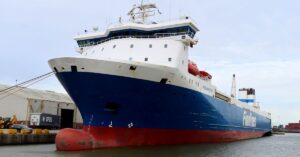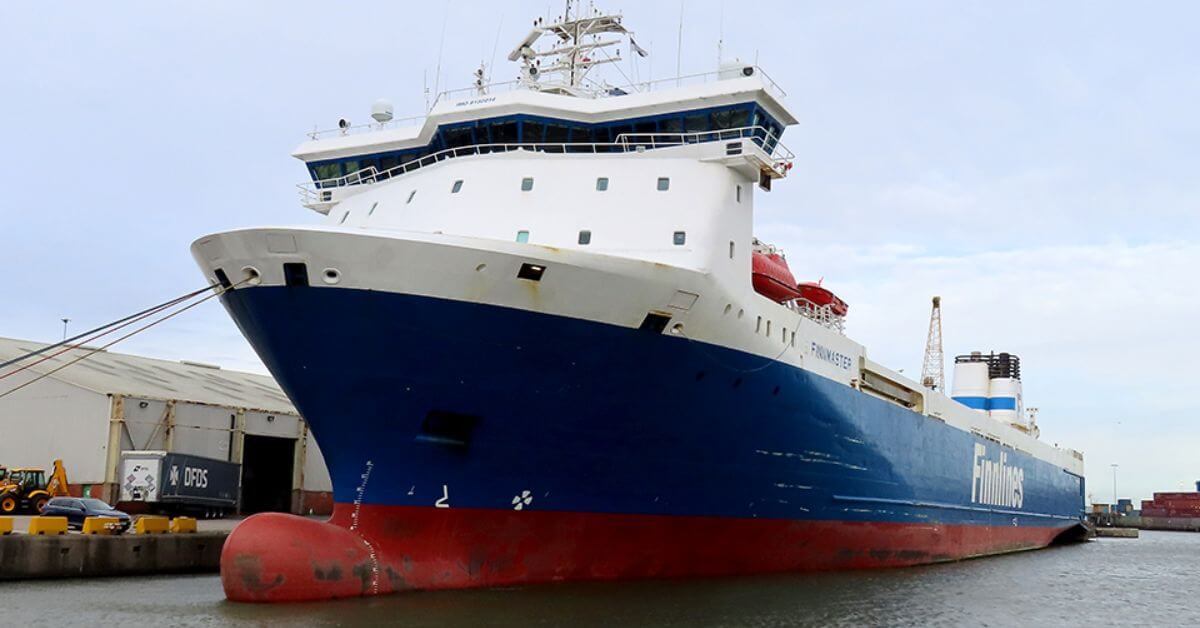
Shipping Giant NYK Line To Expand LNG Fleet By 50% Amid Rising Demand
September 19, 2025
Italian Dockworkers Block Weapons Shipment En Route To Israeli Port Of Haifa
September 19, 2025

A fire broke out in the auxiliary engine room of the Finland-registered roll-on/roll-off cargo ship Finnmaster while it was departing Hull, England, on 19 September 2021, causing extensive damage to the engine room and leaving the vessel without power.
The 8,800 dwt Finnmaster, built in 1998, was carrying RoRo and containerised cargo on its regular Hull–Helsinki route with a crew of 16. Smoke alarms sounded eight minutes after the vessel cast off, and the fire was quickly discovered in the auxiliary engine room. Within four minutes, the ship lost all main electrical power and propulsion, leaving it drifting while the crew struggled to control the fire.
Investigators from the UK Marine Accident Investigation Branch (MAIB) found that the fire started due to a malfunction in one of the auxiliary engines. Hot exhaust gases came into contact with a flexible hose that had been installed during an unapproved modification. The hose failed under pressure, leaking fuel onto a hot surface where it ignited. The hose did not meet required safety standards and was installed in an unsafe position.
Multiple system failures complicated the response. The emergency generator’s circuit breaker malfunctioned, preventing it from supplying power to essential emergency systems. The fixed CO2 fire-extinguishing system failed to operate fully because of defects in its hose assembly and leaks in the pilot system. Additionally, handheld UHF radios used by engineers failed, cutting off communication with the bridge.
Crew members initially attempted to fight the fire with dry powder extinguishers but were forced out by intense heat. Some engineers remained at operational stations or went to emergency muster points. An electrician tried restoring power with flashlights as the crew worked in the dark.
Upon noticing that some CO2 bottles had not activated, a team re-entered the engine room wearing compressed air breathing apparatus and successfully extinguished the remaining fire. The MAIB reported that the crew’s response was largely ineffective due to the loss of critical safety systems.
Two tugs were dispatched within 11 minutes of the alarm. The first reached the ship after 11 minutes, followed by the second, and the vessel was safely re-berthed approximately 50 minutes after leaving the dock.
The fire caused significant damage to the auxiliary engine room, melting plastic components, damaging wiring, and leaving smoke damage localised mostly to the compartment.
The MAIB made a total of 12 recommendations to prevent similar incidents. The Finnish administration, TRAFICOM, was advised to propose amendments to the International Maritime Organisation (IMO) on testing emergency power and radio systems, as well as guidance on fixed fire-extinguishing systems.
Finnlines Plc was recommended to revise and update its crew training, emergency response procedures, and defect reporting systems. RINA was urged to propose to the International Association of Classification Societies an urgent review of procedures for service providers maintaining fire protection systems and to update guidance provided to surveyors and chief engineers.
After repairs, the vessel returned to service under Grimaldi in 2022 and has been managed by Balearia since 2024.
Read the full report here.
Reference: MAIB
Source: Maritime Shipping News


